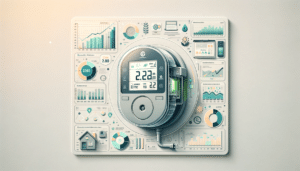Introduction – Disadvantages Of Smart Meters
Embracing sustainability and smarter living, smart meters are steadily emerging as a common feature in many homes. This comprehensive guide will journey you through the ins and outs of smart meters, including their advantages, disadvantages, and what you need to know before committing to one.

Disadvantages of Smart Meters
Despite the many benefits of smart meters, they do carry a host of disadvantages. Key issues revolve around privacy, user control, and hidden costs. From gathering detailed usage data that can lead to potential privacy breaches to hidden costs associated with device setup and maintenance, the negatives of smart meters are notable. Health concerns, such as exposure to radiofrequency radiation, remain, even though research confirms minimal risk.
1. Privacy Concerns:
- Data Collection and Potential Breaches: Smart meters collect detailed energy usage data, which can lead to potential privacy breaches if not properly secured.
- Consumer Data Vulnerability: The convenience of real-time energy consumption data must be balanced with the need to protect sensitive consumer data from potential breaches.
- Web Resource: For a comprehensive understanding of privacy concerns related to smart meters, the article “Privacy Preservation in Smart Meters: Current Status, Challenges and Future Directions” from PubMed Central provides valuable insights.
2. User Control Issues:
- Limited Control Over Data: Users might not have full control over how their data is used or who it is shared with.
- Inflexibility: Some smart meters might not offer users the flexibility to choose their billing cycles or to opt-out of certain data collection features.
- Remote Control by Utilities: Smart meters can be seen as potential targets for malicious actors. A compromised meter can manipulate utility data and even control home appliances.
- Web Resource: For a deeper understanding of user control issues related to smart meters, the IEEE Smart Grid article provides comprehensive insights into the challenges and potential solutions.
3. Hidden Costs:
- Installation and Rollout Fees: The full cost of the smart meter rollout is significant and is passed on to consumers through higher energy bills.
- Uncertain Savings: The government’s projected savings might be overly optimistic. The data from smart meters needs to be translated into actionable insights for consumers to realize actual savings.
- Web Resource: For a detailed breakdown of the hidden costs associated with smart meters, the Loop Homes article offers a comprehensive overview.
4. Health Concerns:
- Radiofrequency Radiation Exposure: Smart meters emit RF radiation, which is low-energy and non-ionizing. There’s a classification by the IARC that RF radiation is “possibly carcinogenic to humans.”
- Comparison with Other Devices: The RF radiation exposure from smart meters is likely much lower than that from other common devices like cell phones.
- Web Resource: For a thorough exploration of the health concerns related to smart meters, the American Cancer Society article provides valuable insights.
Addressing Issues with Smart Meters
Taking proactive measures like ensuring robust privacy protections, understanding the total upfront costs, selecting user-friendly brands, and maintaining a calculated distance from the operating device can help mitigate most issues. Stringent steps to ensure safety, such as keeping the meter installed outside of the main living area, also add another layer of protection.
The Decision to Switch: Things to Consider
Switching to a smart-meter system is not a decision to be made lightly. Factors such as your energy consumption patterns, the cost of device setup and potential energy savings, alongside understanding the possible pitfalls, form a vital checklist for prospective smart meter users.
Smart Meters – What Are They
If you made it this far and don’t quite know what are smart meters, then this part is for you. Smart meters are innovative digital devices designed to record electric energy use and send this information to the electricity supplier for precise billing. They’re regarded as being super convenient for offer real time info on energy usage. Smart meters are available from a variety of brands, including Siemens and Landis+Gyr.
Siemens
A global powerhouse in energy management, Siemens creates smart meters that are easy to use and deliver consistently reliable data. What sets Siemens smart meters apart is their exceptional interoperability. They can smoothly integrate with different communication systems to provide a seamless user experience. Additionally, features such as remote meter reading, event logging, and power quality monitoring increase their appeal. However, their high-end price might deter budget-conscious consumers.
Landis+Gyr
Landis+Gyr, a Swiss-based leader in smart metering, pushes the innovation envelope with its offerings. The smart meters from Landis+Gyr highlight advanced features like dynamic billing and multi-energy metering, along with access to a consumer portal. The precision of consumption readings and real-time insights into power usage enable users to have better control over their energy consumption. Despite the occasional report of less-than-ideal after-sales service, Landis+Gyr stands as a strong player in the realm of sustainable energy management.
Smart Meters and Sustainability
In the context of carbon footprint reduction and sustainable living, smart meters have an instrumental role to play. Equipped with the ability to provide real-time feedback on energy consumption, these devices enable users to identify patterns of energy wastage, thus promoting more mindful and efficient use of resources.
Conclusion
The journey from contemplating a smart meter to installing one is filled with considerations. Adequately exploring the advantages, acknowledging the disadvantages, and consulting with professionals or experienced users, will equip you with the knowledge you need. Here’s to making an informed decision towards a smarter, more sustainable lifestyle!
